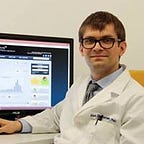We Know How to Price Options, What About Pricing Data?
Paper reference:
The Advent of Human Life Data Economics
Recent advances in artificial intelligence and precision medicine led to the emergence of new businesses that trade and process human health data. Most pharmaceutical companies are acquiring large volumes of clinical and other data for research and marketing purposes. However, there are few examples of companies turning this data into new therapeutic products and it is difficult to estimate the potential benefits stemming from a specific data type or a combination. Unlike in finance, where there are established methods for pricing anything from money to complex derivative securities, there are no established models for estimating the value of human life data.
George Church pioneered many areas of science and technology and inspired three generations of scientists in multiple areas. This paper presents a call for new models for valuing human life data with the many proposed parameters. Leading economists and mathematicians are invited to collaborate on data pricing models in the context of human health. When human life data can be considered to be an asset in the context of financial accounting and can be easily traded, we are likely to see an explosion of data-driven biomedical innovation.
One of the ways to develop the data economics models is to establish a marketplace for human life data where patients can take control of their data and profit from either the direct sale of this data, or share in the profits generated using this data. In the paper titled “The Advent of Human Life Data Economics” in Cell Trends in Molecular Medicine, George Church, a professor at Harvard Medical School and the co-founder of Nebula Genomics and Alex Zhavoronkov, the founder of Insilico Medicine present a concept of data economics with the multiple parameters impacting the value of human life data. The paper provides an overview of the blockchain-enabled platforms for exchanging medical records after the burst of the blockchain bubble.
“In addition to these hack-resistant public ledgers, we have rapidly improving tools for whole genome sequencing and homomorphic encryption queries to deliver better privacy so that many people can finally benefit from knowing and owning their own genomes,” said George Church, Ph.D., Professor of Genetics at Harvard Medical School and a founding member of the Wyss Institute for Biologically Inspired Engineering at Harvard.
The healthcare industry has increasingly adopted blockchain technologies for life data management to improve the quality, efficiency, and transparency of the health care system. The growth of electronic patient records has led to the artificial intelligence-based data analysis that can provide unprecedented insights into human health. Adopting big data technologies in the healthcare sector carries many benefits, but it also raises some barriers and challenges.
With the continued growth of the blockchain technology within the healthcare system, data security, patient data privacy and the ability to manage consent and share data benefits with the patients, has become more vital than ever. Storing and processing medical data in the cloud, or the closed ecosystem, which prevents its illegal usage, blockchain technology can increase patients’ engagement by allowing them to make profit from the initial sale of the data.
The idea of pricing human data is not new. There are multiple companies engaged in data trade.
Any economists out there interested in a collaboration?
